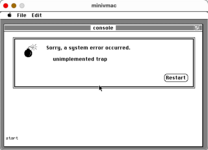I've been looking for more precise timing than the 60Hz resolution TickCount() provides. I'm using THINK C 6.0.1. This is what I've found so far:
Is there some memory address I can read to get a raw timer? I can account for frequency differences between machines.
Thanks
- A Time Manager exploit which doesn't seem very efficient or reliable:
- The System 7 Microseconds() function, which I'd be happy to use, but I'm not sure if it's possible with THINK C 6.0.1. I'm willing to give up System 6 support for this.
Is there some memory address I can read to get a raw timer? I can account for frequency differences between machines.
Thanks

